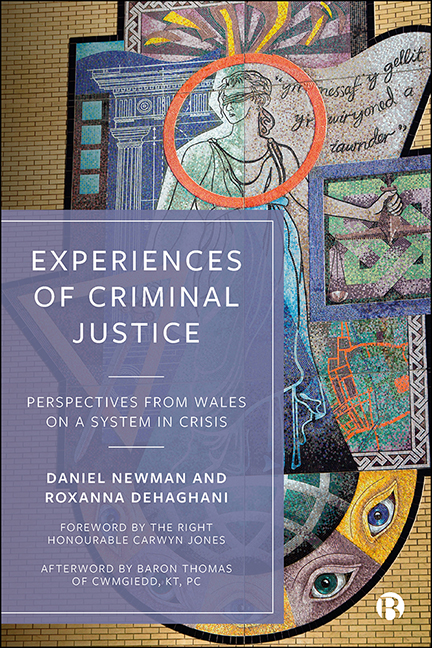Book contents
- Frontmatter
- Contents
- List of Figures and Tables
- Foreword
- Acknowledgements
- 1 Why Wales?
- 2 A System in Crisis
- 3 The People and Their Experiences
- 4 Criminal Justice in Its Place
- 5 Pressures of Practice
- 6 Criminal Justice Relationships
- 7 Navigating the Criminal Justice System
- 8 Doing Criminal Justice Differently
- Afterword
- References
- Index
7 - Navigating the Criminal Justice System
Published online by Cambridge University Press: 15 September 2022
- Frontmatter
- Contents
- List of Figures and Tables
- Foreword
- Acknowledgements
- 1 Why Wales?
- 2 A System in Crisis
- 3 The People and Their Experiences
- 4 Criminal Justice in Its Place
- 5 Pressures of Practice
- 6 Criminal Justice Relationships
- 7 Navigating the Criminal Justice System
- 8 Doing Criminal Justice Differently
- Afterword
- References
- Index
Summary
Introduction
The previous chapter looked at the relationships at the heart of the criminal justice system to draw out how criminal justice works in practice. We looked at working relationships and lawyer– client relationships, and, while the accused were considered, the practitioners who mediate the accused's experiences of justice were at the fore. In this chapter, our focus switches to the accused and the family members, and their relation to the criminal justice system. Placing these voices at the forefront of the chapter gives more depth to understandings of the lawyer– client relationship and, thereon, of what it is to experience the criminal justice system.
The opportunity to combine the voices of defendants and practitioners in the criminal justice system and to analyse their experiences was a key motivation for this study. Kendall (2018), for example, has argued that suspects’ voices need to be better integrated into criminal justice accounts, and Jacobson et al (2016) have presented the court process as anxiety inducing and confusing for defendants, thus highlighting the need to consider the experiences of court users. Yet, undoubtedly, in part, owing to issues of access, the accused's experience is under-researched within criminal justice studies, particularly those centred on questions of access to criminal justice. Yow (2018) has argued that research can have positive emotional impacts on interviewees, and Mitchell (2019) suggests that sharing painful stories with an ‘enlightened witness’ during interview can help start the healing process after a trauma. Many of the accused and their families told us how much they appreciated being listened to; it is important to our mission for us to centre their voices here.
This chapter is dedicated to exploring these often neglected individuals: those accused of committing criminal offences and those who have experienced the criminal process as family members of the accused. Our focus was not to examine satisfaction – or otherwise – with the criminal process, but instead to explore their views on their treatment during the process, their experiences of, for example, attending and appearing in court, and their interpretations of their interactions with other criminal justice actors. However, given the nature of semi-structured interviews, many interviewees did indeed comment on their dissatisfaction with outcomes.
- Type
- Chapter
- Information
- Experiences of Criminal JusticePerspectives from Wales on a System in Crisis, pp. 172 - 202Publisher: Bristol University PressPrint publication year: 2022



